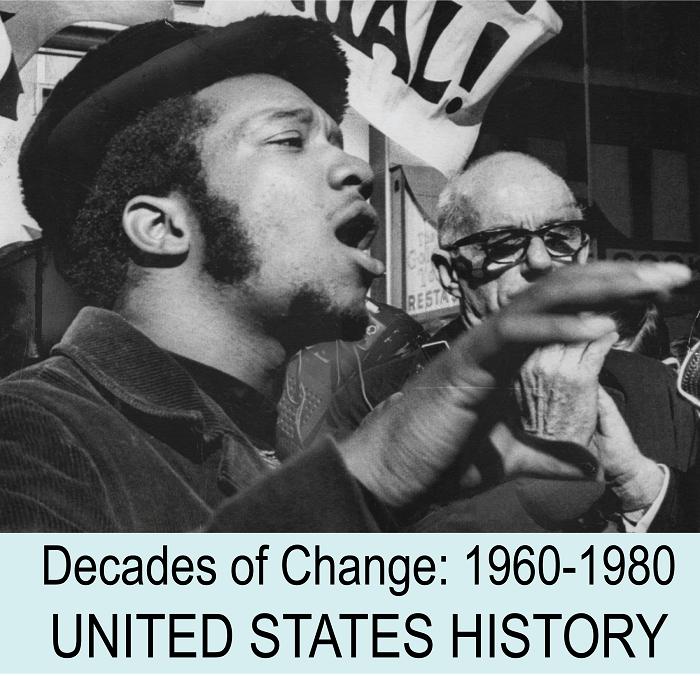Unit XIII: Decades of Change: 1960-1980 |
| www.studenthandouts.com > U.S. History > Decades of Change |
| Decades of Change Books and Films | Decades of Change Miscellany |
| Decades of Change Image Galleries | Decades of Change Games |
| Decades of Change Worksheets | Decades of Change Outlines & PowerPoints |
The period between 1960 and 1980 was marked by significant changes in the United States, spanning political, social, cultural, and economic aspects. Here is a summary of some of the key changes that occurred during this era in United States history.
 Civil Rights Movement: The 1960s were a pivotal time for the Civil Rights Movement, with landmark events such as the Civil Rights Act of 1964 and the Voting Rights Act of 1965. This legislation aimed to end racial segregation and discrimination, protect voting rights for African Americans, and promote greater racial equality.
Civil Rights Movement: The 1960s were a pivotal time for the Civil Rights Movement, with landmark events such as the Civil Rights Act of 1964 and the Voting Rights Act of 1965. This legislation aimed to end racial segregation and discrimination, protect voting rights for African Americans, and promote greater racial equality. Anti-War Protests and Vietnam War: The Vietnam War dominated much of this period. Opposition to the war grew, leading to widespread anti-war protests, especially among young people. The war's unpopularity contributed to the decline of President Lyndon B. Johnson's popularity and his decision not to seek re-election in 1968. Counterculture and Social Change: The 1960s and early 1970s saw the emergence of a counterculture that challenged traditional norms. This period witnessed the rise of the hippie movement, the sexual revolution, and a focus on civil liberties and individual rights. Women's Liberation Movement: Second-wave feminism gained momentum during the 1960s and 1970s, leading to significant advancements in women's rights, including the Roe v. Wade decision in 1973 (overturned by Dobbs in 2022), which legalized abortion. The movement also resulted in greater awareness of issues like workplace discrimination and sexual harassment. Environmental Movement: Concerns about environmental degradation led to the birth of the modern environmental movement. This era saw the establishment of key environmental laws, such as the Clean Air Act and the Clean Water Act, aimed at protecting the environment. Space Exploration: The United States made significant strides in space exploration during this period, including the Apollo 11 mission in 1969, which landed the first humans on the moon. This marked a major achievement in the space race against the Soviet Union. Political Changes: The era included significant political shifts, such as the assassination of President John F. Kennedy in 1963 and the subsequent presidency of Lyndon B. Johnson. Richard Nixon's presidency, which began in 1969, brought about both domestic policies, such as environmental regulations and the creation of the Environmental Protection Agency, and foreign policy developments, such as the normalization of relations with China. Economic Challenges: The United States faced economic challenges during this period, including high inflation and an energy crisis in the 1970s. These issues prompted discussions about energy conservation and increased reliance on foreign oil. Cultural Icons and Trends: The 1960s and 1970s produced cultural icons and trends, including the music of Janis Joplin, Jimi Hendrix, the Doors, and the Osmonds, and the rise of rock 'n' roll, the popularity of disco music in the 1970s, and the emergence of iconic figures like Muhammad Ali and Elvis Presley. Rise of Conservative Movement: By the late 1970s, a conservative political movement gained momentum, with the election of Ronald Reagan as President in 1980. Reagan's presidency would bring about a shift in economic policies, emphasizing deregulation and tax cuts. These changes between 1960 and 1980 reflect a dynamic period in American history marked by social and cultural upheaval, political transformation, and significant progress in civil rights and social justice. It set the stage for the subsequent decades' developments and political ideologies. |
| UNIT I: | Early America | UNIT IX: | Discontent and Reform | ||
| UNIT II: | Colonial Period | UNIT X: | War, Prosperity, and Depression | ||
| UNIT III: | American Revolution | UNIT XI: | New Deal and World War II | ||
| UNIT IV: | New National Government | UNIT XII: | Postwar America | ||
| UNIT V: | Westward Expansion | UNIT XIII: | Decades of Change | ||
| UNIT VI: | Sectional Conflict | UNIT XIV: | New Conservatism | ||
| UNIT VII: | Civil War and Reconstruction | UNIT XV: | Into the Twenty-first Century | ||
| UNIT VIII: | Growth and Transformation | UNIT XVI: | Polarization and Deglobalization |
| www.studenthandouts.com > U.S. History > Decades of Change |







